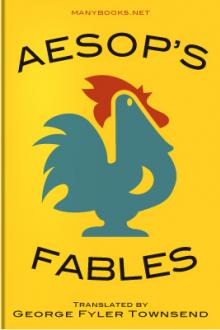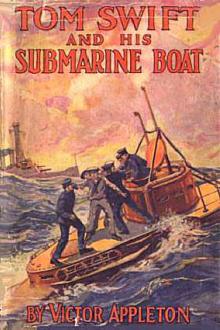The Curse of Capistrano, Harrington Strong [best new books to read .TXT] 📗

- Author: Harrington Strong
- Performer: -
Book online «The Curse of Capistrano, Harrington Strong [best new books to read .TXT] 📗». Author Harrington Strong
That was true, Don Carlos knew, but he was too wise to admit it and so speak treason. Heaven knew he was enough in the bad graces of the governor now without offending him more by treating with courtesy this man for whose carcass the governor had offered a reward.
“What do you wish here?” he asked.
“I crave your hospitality, Senor. In other words, I would eat and drink. I am a caballero, hence make my claim in justice.”
“Whatever good blood once flowed in your veins has been fouled by your actions,” Don Carlos said. “A thief and highwayman has no claim upon the hospitality of this hacienda.”
“I take it that you fear to feed me, since the governor may hear of it,” Senor Zorro answered. “You may say that you were forced to do it. And that will be the truth.”
Now one hand came from beneath the cloak, and it held a pistol. Dona Catalina shrieked and fainted, and Senorita Lolita cowered in her chair.
“Doubly a scoundrel, since you frighten women!” Don Carlos exclaimed angrily. “Since it is death to refuse, you may have meat and drink. But I ask you to be caballero enough to allow me to remove my wife to another room and call a native woman to care for her.”
“By all means,” Senor Zorro said. “But the senorita remains here as hostage for your good conduct and return.”
Don Carlos glanced at the man, and then at the girl, and saw that the latter was not afraid. He. picked his wife up in his arms and bore her through the doorway, roaring for servants to come.
Senor Zorro walked around the end of the table, bowed to Lolita again, and sat down in a chair beside her.
“This is foolhardiness, no doubt, but I had to see your beaming face again,” he said.
“Senor!”
“The sight of you this afternoon started a conflagration in my heart, senorita. The touch of your hand was new life to me.”
Lolita turned away, her face flaming, and Senor Zorro moved his chair nearer and reached for her hand, but she eluded him.
“The longing to hear the music of your voice, senorita, may lure me here often,” he said.
“Senor! You must never come again! I was lenient with you this afternoon, but I can not be again. The next time I shall shriek, and you will be taken.”
“You could not be so cruel,” he said.
“Your fate would be upon your own head, senor.”
Then Don Carlos came back into the room, and Senor Zorro arose and bowed once more.
“I trust your wife has recovered from her swoon,” he said. “I regret that the sight of my poor pistol frightened her.”
“She has recovered,” Don Carlos said. “I believe you .said that you wished meat and drink. Now that I come to think of it, senor, you have indeed done some things that I have admired, and I am happy to grant you hospitality for a time. A servant shall furnish you food immediately.”
Don Carlos walked to the door, called a native, and gave his orders. Don Carlos was well pleased with himself. Carrying his wife into the next room had given him his chance. For servants had answered his call, and among them had been one he trusted. And he had ordered the man to take the swiftest horse and ride like the wind the four miles to the pueblo, and there to spread the alarm that Senor Zorro was at the Pulido hacienda.
His object now was to delay this Senor Zorro as much as possible. For he knew the soldiers would come and the highwayman be killed or captured, and surely the governor would admit that Don Carlos was entitled to some consideration for what he had done.
“You must have had some stirring adventures, senor,” Don Carlos said as he returned to the table.
“A few,” the highwayman admitted.
“There was that affair at Santa Barbara, for instance. I never did hear the straight of that.”
“I dislike to speak of my own work, senor.”
“Please,” the Senorita Lolita begged; and so Senor Zorro overcame his scruples for the time being.
“It really was nothing,” he said. “I arrived in the vicinity of Santa Barbara at sunset. There is a fellow there who runs a store, and he had been beating natives and stealing from the frailes. He would demand that the frailes sell him goods from the mission, and then complain that the weight was short, and the governor’s men would make the frailes deliver more. So I resolved to punish the man.”
“Pray continue, senor,” said Don Carlos, bending forward as if deeply interested.
“I dismounted at the door of his building and walked inside. He had candles burning, and there were half a dozen fellows trading with him. I covered them with my pistol and drove them into a corner and ordered this storekeeper before me. I frightened him thoroughly, and forced him to disgorge the money he had in a secret hiding-place. And then I lashed him with a whip taken from his own wall, and told him why I had done it.”
“Excellent!” Don Carlos cried.
“Then I sprang on my horse and dashed away. At a native’s hut I made a placard, saying that I was a friend of the oppressed. Feeling particularly bold that evening, I galloped up to the door of the presidio, brushed aside the sentry—who took me for a courier—and pinned the placard to the door of the presidio with my knife. Just then the soldiers came rushing out. I fired over their heads, and while they were bewildered I rode away toward the hills.”
“And escaped!” Don Carlos exclaimed.
“I am here!—that is your answer.”
“And why is the governor so particularly bitter against you, Senor?” Don Carlos asked. “There are other highwaymen to whom he gives not a thought.”
“Ha! I had a personal clash with his excellency. He was driving from San Francisco de Asis to Santa Barbara on official business, with an escort of soldiers about him. They stopped at a brook to refresh themselves, and the soldiers scattered while the governor spoke with his friends. I was hiding in the forest and suddenly dashed out and at them.
“Instantly I was at the open door of the coach. I presented my pistol at his head and ordered him to hand over his fat purse—which he did. Then I spurred through his soldiers, upsetting several as I did so—”
“And escaped!” Don Carlos cried.
“I am here,” assented Senor Zorro.
The servant brought a tray of food and placed it before the highwayman, retreating as soon as possible, his eyes big with fear and his hands trembling, for many weird tales had been told of this same Senor Zorro and his brutality, none of which was true.
“I am sure that you will pardon me,” Senor Zorro said, “when I ask you to sit at the far end of the room. As I take each bite, I must raise the bottom of my mask, for I have no wish to become known. I put the pistol before me on the table, so, to discourage treachery. And now, Don Carlos Pulido, I shall* do justice to the meal you have so kindly furnished.”
Don Carlos and his daughter sat where they had been directed, and the bandit ate with evident relish. Now and then he stopped to talk to them, and once he had Don Carlos send out for more wine, declaring it to be the best he had tasted for a year.
Don Carlos was only too glad to oblige him. He was playing to gain time. He knew the horse the native rode, and judged that he had reached the presidio at Reina de Los Angeles before this, and that the soldiers were on their way. If he could hold this Senor Zorro until they arrived!
“I am having some food prepared for you to carry with you, senor,” he said. “You will pardon me while I get it? My daughter will entertain you.”
Senor Zorro bowed, and Don Carlos hurried from the room. But Don Carlos had made a mistake in his eagerness. It was an unusual thing for a girl to be left alone in the company of a man in such fashion, especially with a man known to be an outlaw. Senor Zorro guessed at once that he was being delayed purposely. For, again, it was an unusual thing for a man like Don Carlos to go for the package of food himself when there were servants that could be called by a mere clapping of the hands. Don Carlos, in fact, had gone into the other room to listen at a window for sounds of galloping horses.
“Senor!” Lolita whispered across the room.
“What is it, senorita?”
“You must go—at once. I am afraid that my father has sent for the soldiers.”
“And you are kind enough to warn me?”
“Do I wish to see you taken here? Do I wish to see fighting and bloodshed?” she asked.
“That is the only reason, senorita?”
“Will you not go, senor?”
“I am loath to rush away from such a charming presence, senorita. May I come again at the next siesta hour?”
“By the saints—no! This must end, Senor Zorro. Go your way—and take care. You have done some things that I admire, hence I would not see you captured. Go north as far as San Francisco de Asis and turn honest, senor. It is the better way.”
“Little priest,” he said.
“Shall you go, senor?’
“But your father has gone to fetch food for me. And could I depart without thanking him for this meal?”
Don Carlos came back into the room then, and Senor Zorro knew by the expression on his face that the soldiers were coming up the trail. The don put a package on the table.
“Some food to carry with you, senor,” he said. “And we would relish more of your reminiscences before you start on your perilous journey.”
“I have spoken too much of myself already, senor, and it ill becomes a caballero to do that. It were better that I thank you and leave you now.”
“At least, senor, drink another mug of wine.”
“I fear,” said Senor Zorro, “that the soldiers are much too close, Don Carlos.”
The face of the don went white at that, for the highwayman was picking up his pistol, and Don Carlos feared he was about to pay the price for his treacherous hospitality. But Senor Zorro made no move to fire.
“I forgive you this breach of hospitality, Don Carlos, because I am an outlaw and there has been a price put upon my head,” he said. “And, also, I hold you no ill will because of it. Buenos noches, senorita! Senor, adios!”
Then a terrified servant who knew little concerning the events of the evening rushed in at the door.
“Master! The soldiers are here!” he cried. “They are surrounding the house!”
ON THE TABLE, NEAR its middle, was an imposing candelero in which half a score of candles burned brightly. Senor Zorro sprang toward it now, and with one sweep of his hand dashed it to the floor, extinguishing all the candles in an instant and plunging the room into darkness.
He evaded the wild rush of Don Carlos, springing across the room so lightly that his soft boots made not the slightest noise to give news of his whereabouts. For an instant the Senorita Lolita felt a .man’s arm around her waist, gently squeezing it, felt a man’s breath on her cheek, and heard a man’s whisper in her ear:
“Until





Comments (0)